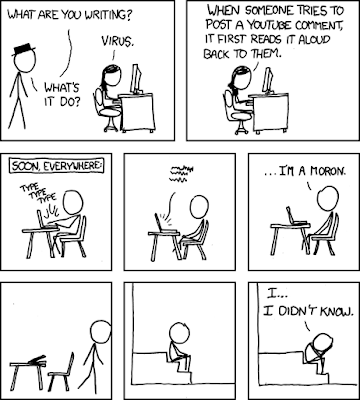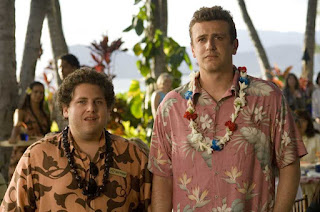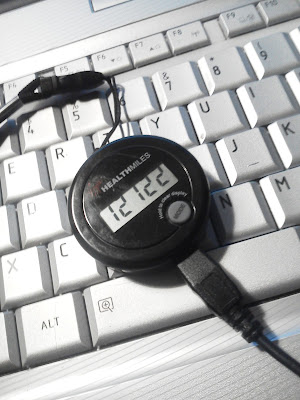Anonymous
Brace yourself: I'm about to say something profound.
The Internet is a vast and lonely place.
Okay, so it lacks profundity but I think we can probably accept it as a simple truth for our time. Sure, there's a place for everyone. There are more online communities and divisions and cliques than the country's largest high school -- but boiled down, it's really just you, alone at your computer.
Hm. This is getting depressing faster than intended.
My point is simple: as much as we like our online communities (there's a reason Facebook is worth billions), not so deep down, we seem to like them as much for their removal from real society.
It was a circuitous route, but this is what I'd really like to discuss today.
Anonymity is one of the best and worst things about this colossal web. You can be anyone -- whether you use that for good or to create fodder for a Lifetime movie.
This anonymity has changed and in many ways dissolved in the last fifteen years, since the days my friends and I liked to pretend we were 18-year-old pre-law students. [WHY DID WE DO THAT?! *Ahem.*] We have in large part traded the chatroom anonymity and alternate personalities for complete disclosure, posting ... everything. Pictures, videos, what we eat, who we're with, where we are at all times, all of it out there for the world to see. Or at least our 386 closest friends.
It's counter-intuitive to survival. A part of me wonders what Darwin would think of us today.
But that original anonymity prevails in very specific places -- the comment threads. Below every picture, video, blog post, and news article, people give vent to their opinions with little to no sense of ownership or personal responsibility. What we say out loud is identified as ours; what we say online could be anyone's.
And for whatever reason, people seem to use these opportunities -- especially on news articles -- to be complete a**h**** to each other. [Censorship mine.]
Why do we do this? Why do we jump on opportunities to treat each other so badly? Why do we use vague screen names that don't actually identify us and then flaunt the worst of ourselves?
What exactly does that achieve?
Is that really the purpose of this worldwide open forum?
Is it really to much to ask that people type only the things they would say out loud to their friends? Or at least to people they actually know?
With these extremes in place, I admit -- sometimes I miss those old days. I know I'd like to be less find-able, despite the fact that I've been blogging for years and could therefore be described as inviting the attention. What I'd really like to see, though, is balance ... and a willingness of all of us to own our opinions.
I'm lucky -- I have great readers. (That's right. I'm sucking up to the five of you.) No matter how badly I insult your intelligence with whatever goes up here, you continue to be pretty great humans. While most of you know me personally or are also bloggers and therefore could only sort of hide, I find it encouraging that you don't cower behind Anonymous.
And I'm not going to kid myself. I know this is a losing battle. Nothing I say will change a thing and it's probably only going to get worse. I am, however, going to dream about it.
If I could read news comments and routinely find something helpful instead of people ripping each other apart for no reason ... wouldn't that make this Internet thing feel a little less lonely?
The Internet is a vast and lonely place.
Okay, so it lacks profundity but I think we can probably accept it as a simple truth for our time. Sure, there's a place for everyone. There are more online communities and divisions and cliques than the country's largest high school -- but boiled down, it's really just you, alone at your computer.
Hm. This is getting depressing faster than intended.
 |
| Oy. If only. |
It was a circuitous route, but this is what I'd really like to discuss today.
Anonymity is one of the best and worst things about this colossal web. You can be anyone -- whether you use that for good or to create fodder for a Lifetime movie.
This anonymity has changed and in many ways dissolved in the last fifteen years, since the days my friends and I liked to pretend we were 18-year-old pre-law students. [WHY DID WE DO THAT?! *Ahem.*] We have in large part traded the chatroom anonymity and alternate personalities for complete disclosure, posting ... everything. Pictures, videos, what we eat, who we're with, where we are at all times, all of it out there for the world to see. Or at least our 386 closest friends.
It's counter-intuitive to survival. A part of me wonders what Darwin would think of us today.
But that original anonymity prevails in very specific places -- the comment threads. Below every picture, video, blog post, and news article, people give vent to their opinions with little to no sense of ownership or personal responsibility. What we say out loud is identified as ours; what we say online could be anyone's.
And for whatever reason, people seem to use these opportunities -- especially on news articles -- to be complete a**h**** to each other. [Censorship mine.]
Why do we do this? Why do we jump on opportunities to treat each other so badly? Why do we use vague screen names that don't actually identify us and then flaunt the worst of ourselves?
What exactly does that achieve?
Is that really the purpose of this worldwide open forum?
Is it really to much to ask that people type only the things they would say out loud to their friends? Or at least to people they actually know?
With these extremes in place, I admit -- sometimes I miss those old days. I know I'd like to be less find-able, despite the fact that I've been blogging for years and could therefore be described as inviting the attention. What I'd really like to see, though, is balance ... and a willingness of all of us to own our opinions.
I'm lucky -- I have great readers. (That's right. I'm sucking up to the five of you.) No matter how badly I insult your intelligence with whatever goes up here, you continue to be pretty great humans. While most of you know me personally or are also bloggers and therefore could only sort of hide, I find it encouraging that you don't cower behind Anonymous.
And I'm not going to kid myself. I know this is a losing battle. Nothing I say will change a thing and it's probably only going to get worse. I am, however, going to dream about it.
If I could read news comments and routinely find something helpful instead of people ripping each other apart for no reason ... wouldn't that make this Internet thing feel a little less lonely?


Comments
In my opinion, the principle benefit of anonymity is the ability of disassociation: separate the idea from the person so that the idea can be judged on its own merits. Politicians, philosophers, writers and artists of all types have lifted the shield of a pseudonym to enrich the world of ideas.
Think of Hamilton, Madison and Jay writing the Federalist Papers under a pen name. Think of Voltaire, Ayn Rand, Mark Twain, George Orwell, and Dr. Seuss; all pseudonyms. Would Mary Ann Evans have had her fiction published if she hadn't called herself George Eliot instead? Would Ann Landers have provided such frank and sure advice if instead the author had to use her own name, Esther Friedman, and suffered from the rebuke of lifetime acquaintances who knew that she didn't always follow her own guidance? These people were not failing to stand behind their ideas; they simply wanted people to consider the ideas - not the imperfect human minds that produced them.
There is something to be said, of course, for standing behind your principles with your own name. John Hancock and other signers of the Declaration of Independence didn't seem to have much trouble taking accountability. Not everyone is similarly endowed; we cannot all have the courage of Galileo or Martin Luther or - for that matter - Martin Luther King.
Those are the big ideas - but the small ideas cause needless suffering as well.
Given that we have morphed into a society where people only seem to "communicate" over open, infinitely replicable mediums, the resulting burden of accountability can be suffocating. Consider the teacher who airs a complaint about a few inept and unruly students on a Facebook wall post; or wants her friends and family to know that she's having fun and unwinding with a few fruity drinks while on vacation with her husband, and winds up unemployed as a result. A pseudonym can be liberating. (Hence: Lee Ryan)
Still, nowadays, I don't know if such fronts work so well. Even on the internet, the anonymity afforded is only a thin veil; transparent to anyone who is willing to take the time to look.
Anonymity - such as it is - and the resulting freedom also often comes at the cost of credibility. Many opinions only seem to "matter" if they come from real people with (maybe not-so-real) credentials. Those (sometimes) capable people who are willing to present their ideas to a wider audience regularly take a beating from anonymous tomato-throwers. Here I think of Nobel Prize-winning social and physical scientists, Pulitzer Prize-winning authors or simply brilliant, wise and good-tempered citizens who bother to share a piece of their hard-earned wisdom or well-considered opinions, only to be shouted-down by crowd of mouth-breathing nincompoops.
Which brings us to the bad side of anonymity which I know we agree on.
It reveals an inherent weakness in human nature.
I am convinced that, not-so-deep down, most people (not all...I hope) are endowed with a limitless reservoir of boiling contempt towards most other people; at least people who live and work around us.(the rest of humanity, we simply do not care about enough to hate) Though polite society asks us to keep this bottled up inside, anonymous comments or profane screeds published under false identities provide a mechanism to release the internal pressure of suppressed hatred. You may not accept such an extreme view, but I can only say that there is a reason why all those smart folks I mentioned before decided that it was better if they used a false name and kept their thoughts and ideas away from those who knew them personally. This has been true even before Jesus observed that a prophet can find honor everywhere except in his home town.
That doesn't mean I think it's "ok" or "healthy" or anything like that; just that it seems to be a natural consequence of the fact that we're human. I'm not sure there is any way to fix it. Ever.